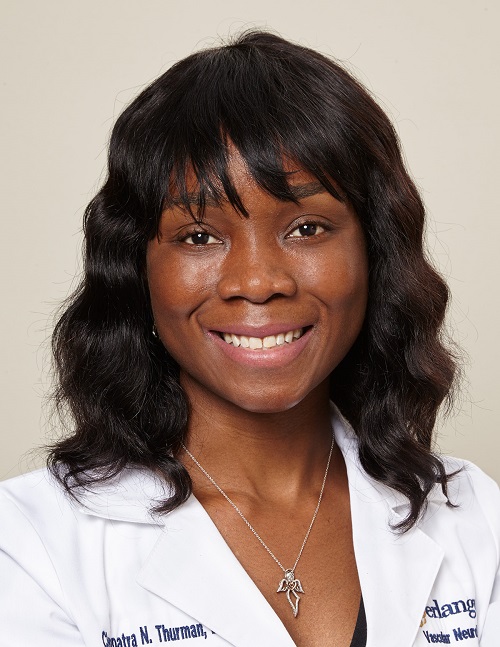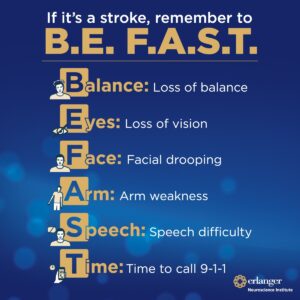To highlight some of our exceptional physicians during Women’s History month, Dr. Cleopatra Thurman, DO, gave us time to discuss her passion for neurology.
Early Life
Dr. Thurman was born the youngest in a family of 6 children. She was raised in the copper rich Province (Copperbelt Province) of a Southern African country known as Zambia. She boasts of being her dad’s favorite, which is a common practice in Africa as the youngest child. She came from an affluent family, and her father was very keen on exposing his children to the world around them. “We were not poor, I went to private schools, enjoyed good health care (compliments of the copper mines) and expectations of my good performance were very high.”
While some physicians have said they always knew they wanted to be doctors from a very young age, Dr. Thurman’s passion for medicine started while watching her sister struggle with Epilepsy and the social stigma that came with it.
“It was unclear why we could not talk about my sister’s illness; it was a secret we kept. Over the years this raised questions as to why we had to keep this secret.”
This concealment continued to fuel her passion, to better understand what happened to her sister. Dr. Thurman attended a Catholic girls-only Boarding School. She started to notice healthcare disparities at the rural clinic affiliated with the school, compelling her further to pursue a career in medicine.
Unfortunately, she lost her beloved father to Cerebral Malaria 3 weeks before her 18th birthday, in her final year of high school. An event which left her devastated. In honor of him, she graduated with very high marks and was accepted to study at the highest institute of learning in Zambia at the time, The University of Zambia. However, the death of her father left her with doubt regarding her future in medicine.
“A small part of me didn’t want to be a doctor anymore; it seemed to open wounds I could not bear. It took me some time to collect myself and regroup. I always knew I wanted to care for people, but I didn’t have the clarity of my path after the loss of my dear Dad, and subsequently losing my sister who struggled with Epilepsy.” Most medical professionals have not had a straight and easy path into their careers, it is common life experiences offer the maturity of thought as they discover their paths in medicine.
Professional Life
Subsequently, she migrated to study in the United States. While in college she started working in a nursing home caring for patients with cognitive impairment such as Dementia, Alzheimer’s, etc. This opportunity transitioned into a job working with brain injury patients, helping them learn to integrate back into society. “I found this very rewarding.”
She received her undergraduate degree in Clinical Laboratory Science. During this time, she took a job in a small office lab working for a group of Osteopathic Physicians. She later worked for a hospital laboratory. “I undoubtedly missed the joy of patient contact. I couldn’t hide behind test tubes any longer, hence the beginning of my journey back to medicine.”
Dr. Thurman’s decision to become a Doctor of Osteopathic Medicine (DO) aligns with her personal philosophy. DOs take a unique approach to healthcare, focusing on treating the “whole person” and emphasizing preventive care. Her philosophy and passion for full spectrum of care for both inpatient and outpatient is exemplified when she speaks about her patients and her approach to care.
Regarding Her Subspecialty
When Dr. Thurman reflects upon her life, the sum of her experiences led to this decision; Neurology encompasses it all! She had great mentors in Neurology during her third year of medical school. Most days she found something fascinating that she could spend hours researching on at home. “I feel fortunate to have a career that I am very passionate about and I have no moment of looking back!”
She is a board-certified Vascular Neurologist and received medical training from Michigan State University College of Osteopathic Medicine in East Lansing. She then completed a Neurology Residency at Sparrow Hospital also in East Lansing, Michigan. She received an award for clinical excellence and a Vascular Neurology Fellowship at Trinity Health St. Mary’s – Grand Rapids, Michigan.
Dr. Thurman is the Stroke Program Director at Baroness Erlanger Hospital. She sees patients across the entire spectrum of neurologic disease; however, she is particularly interested in managing young stroke patients and bridging the gap in stroke care among underserved populations. Disability, secondary to stroke, remains high worldwide. She is passionate about ensuring that all stroke patients receive quality acute and long-term care. Finally, stroke prevention remains a priority in underserved communities to Dr. Thurman.
Tips for stroke prevention:
- Diet and healthy eating: Following a proper diet may prevent a second stroke.
- Decreasing the amount of cholesterol and saturated fat in your diet.
- Controlling Diabetes (Type 1 & Type 2).
- Monitoring blood pressure: As high blood pressure exerts continuous pressure on the walls of the arteries, it may lead to an arterial block.
- Avoiding illicit drugs
- Exercising: Consult your doctor before starting an exercise program.
- Quit smoking and alcohol.
The Erlanger Southeast Regional Stroke Center is one of the largest stroke centers in the nation and one of the most accomplished. As a Comprehensive Stroke Center (CSC) certified by the DNV GL Healthcare USA, the Erlanger Regional Stroke Center can significantly improve outcomes for stroke patients by offering more treatment options and by adhering to high national standards and guidelines.
Click the image below to learn more about how to B.E.F.A.S.T. In a stroke, time lost is brain lost.








